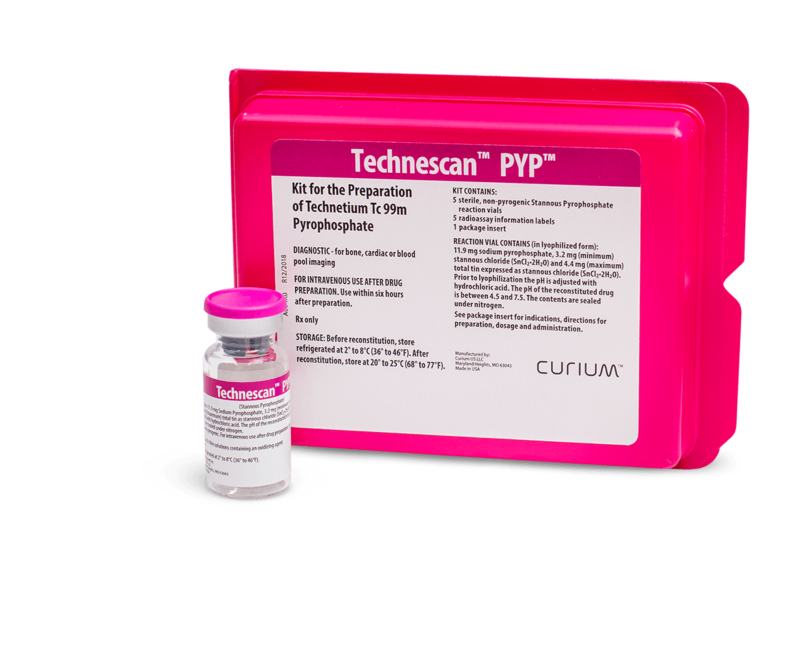

U.S Spect products | Others
Technescan™ PYP™
(kit for the preparation of technetium Tc 99m pyrophosphate injection)
This information is intended for U.S. healthcare professionals only.
Product information
Technescan™ PYP™ (Kit for the Preparation of Technetium Tc 99m Pyrophosphate Injection) is a sterile, non-pyrogenic, diagnostic radiopharmaceutical suitable for intravenous administration after reconstitution with sterile sodium pertechnetate Tc 99m injection or sterile 0.9% sodium chloride injection.
Each 10 milliliter reaction vial contains 11.9 milligrams sodium pyrophosphate, 3.2 milligrams (minimum) stannous chloride (SnCl2•2H2O) and 4.4 milligrams (maximum) total tin expressed as stannous chloride (SnCl2•2H2O) in lyophilized form under an atmosphere of nitrogen. Prior to lyophilization the pH is adjusted with hydrochloric acid. The pH of the reconstituted drug is between 4.5 and 7.5. No bacteriostatic preservative is present.
Indication & Usage
Technescan™ PYP™ (kit for the preparation of technetium Tc 99m pyrophosphate injection) is a blood pool imaging agent which may be used for gated blood pool imaging and for the detection of sites of gastrointestinal bleeding. When administered intravenously 15 to 30 minutes prior to intravenous administration of sodium pertechnetate Tc 99m for in vivo red blood cell labeling, approximately 75 percent of the injected activity remains in the blood pool. The modified in vivo/in vitro red blood cell labeling method may also be used for blood pool imaging.
Technescan PYP (kit for the preparation of technetium Tc 99m pyrophosphate injection) is a skeletal imaging agent used to demonstrate areas of altered osteogenesis, and a cardiac imaging agent used as an adjunct in the diagnosis of acute myocardial infarction.
Important risk information
Warnings and precautions
- As an adjunct in the diagnosis of confirmed myocardial infarction (ECG and serum enzymes positive), the incidence of false negative images has been found to be 6 percent. False negative images can also occur if made too early in the evolutionary phase of the infarct or too late in the resolution phase. False positive images have been reported following coronary by-pass graft surgery, in unstable angina pectoris, old myocardial infarcts and in cardiac contusions.
- Brain imaging should precede bone imaging procedures due to the potential of false negative and false positive imaging results.
- Impairment of blood pool images may occur in patients receiving sodium heparin for anticoagulant therapy. This is characterized by a reduction in the amount of injected radioactivity remaining in the blood pool.
- Technescan PYP should be injected by direct venipuncture. Heparinized catheter systems should be avoided.
- Technescan PYP should not be used more than six hours after preparation.
- It is essential that the user follow the directions carefully and adhere to strict aseptic procedures during preparation.
- The contents of this kit are not radioactive. However, after sodium pertechnetate Tc 99m is added, adequate shielding of the final preparation must be maintained.
- Any sodium pertechnetate Tc 99m solution which contains an oxidizing agent is not suitable for use in the preparation of Technetium Tc 99m Pyrophosphate Injection.
- Technetium Tc 99m Pyrophosphate as well as other radioactive drugs, must be handled with care, and appropriate safety measures should be used to minimize radiation exposure to the patients consistent with proper patient management and to insure minimum radiation exposure to occupational workers.
- Radiopharmaceuticals should be used only by physicians who are qualified by specific training in the safe use and handling of radionuclides.
- Both prior to and following administration of Technetium Tc 99m Pyrophosphate Injection, patients should be encouraged to drink fluids. Patients should void as often as possible after administration of Technetium Tc 99m Pyrophosphate Injection to minimize background interference from its accumulation in the bladder and to reduce unnecessary exposure to radiation.
- The patient’s cardiac condition should be stable before beginning the cardiac imaging procedure.
Adverse reactions
- Adverse reactions may include hypotension, fever and chills and hypersensitivity reactions such as itching and various skin rashes.
Use in specific populations
- Pregnancy: Technescan PYP should not be administered to pregnant women unless it is considered that the benefits to be gained outweigh the potential hazards to the fetus.
- Breast feeding: Should be temporarily discontinued because Technetium Tc 99m is excreted in human milk during lactation.
- Safety and effectiveness in pediatric patients have not been established.
Frequently asked questions
The kits have a six (6) month expiration from date of manufacture. Each product package is labeled with the specific expiration date. It should not be used after the expiration date stated on the package label.
It should not be used more than six (6) hours from the time of preparation.
Technescan PYP can be ordered through your local Sales Representative, or our Customer Service Department at 888.744.1414, option 1 then option 2. Orders are accepted Monday – Friday, 7:00 am to 5:00 pm. CST.
Call Curium Pharmacovigilance / Product Monitoring Department at 866.789.2211
How is this product supplied
Order information
| Description | Qty | Unit | Size | Order # | NDC |
|---|---|---|---|---|---|
| Technescan PYP kit, 5 vial | 1 | Kit | 5 vial | N094B0 | 69945-094-20 |